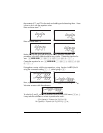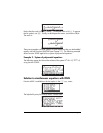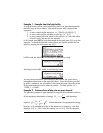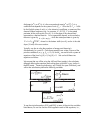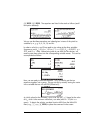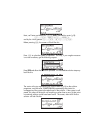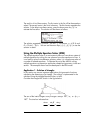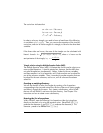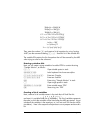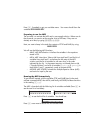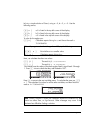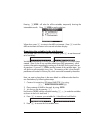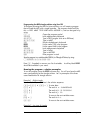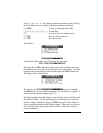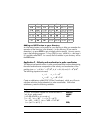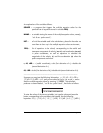
Page 7-11
‘SIN(α)/a = SIN(β)/b’
‘SIN(α)/a = SIN(γ)/c’
‘SIN(β)/b = SIN(γ)/c’
‘c^2 = a^2+b^2-2*a*b*COS(γ)’
‘b^2 = a^2+c^2-2*a*c*COS(β)’
‘a^2 = b^2+c^2-2*b*c*COS(α)’
‘α+β+γ = 180’
‘s = (a+b+c)/2’
‘A = √ (s*(s-a)*(s-b)*(s-c))’
Then, enter the number 9, and create a list of equations by using: function
LIST (use the command catalog ‚N). Store this list in the variable EQ.
The variable EQ contains the list of equations that will be scanned by the MES
when trying to solve for the unknowns.
Entering a window title
Next, we will create a string variable to be called TITLE to contain the string
“Triangle Solution”, as follows:
‚Õ Open double quotes in stack
~~„~ Locks keyboard into lower-case alpha.
„triangle# Enter text: Triangle_
„solution Enter text: Solution
` Enter string “Triangle Solution” in stack
³ Open single quotes in stack
~~title` Enter variable name ‘TITLE’
K Store string into ‘TITLE’
Creating a list of variables
Next, create a list of variable names in the stack that will look like this:
{ a b c α β γ A s }
and store it in variable LVARI (List of VARIables). The list of variables represents
the order in which the variables will be listed when the MES gets started. It must
include all the variables in the equations, or it will not work with function MITM
(see below). Here is the sequence of keystrokes to use to prepare and store this
list:



